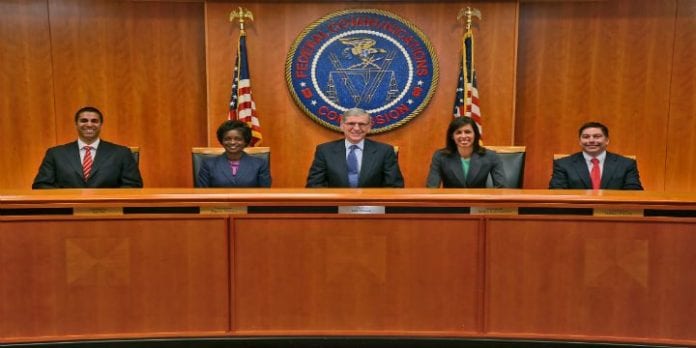Stage four of the FCC 600 MHz incentive auction process begins today with high hopes, though leadership at the government agency is in flux.
Television broadcasters are back on the clock as part of the Federal Communications Commission’s 600 MHz incentive auction proceedings, this time laying out how much compensation they want for 84 megahertz of spectrum from the telecommunications industry.
The fourth stage of the FCC’s incentive auction process kicked off today, following three previous attempts to find a financial agreement between television broadcasters and telecom operators in need of low-band spectrum to support “5G” services. Each of the previous stages failed to find that match, with the past two stages failing to find any real excitement from the likes of Verizon Communications, AT&T and T-Mobile US.
Assuming a successful completion to stage four’s reverse auction process, the forward auction is set to include a total of 2,912 “category one” spectrum blocks, each containing 10 megahertz of spectrum with no impairment. Each of the 416 partial economic areas used to divide up the spectrum licenses will include seven blocks of spectrum, with a total of 70 megahertz of spectrum up for grab in each PEA.
Analysts going into the auction process had highlighted the 84-megahertz stage as one with the highest likelihood of finding some common ground due to the relatively small amount of impaired spectrum.
The 70-megahertz mark is also seen as the magic number for T-Mobile US and other carriers with a dearth of sub-1 GHz spectrum holdings. Pre-auction rules include a set-aside provision that calls for 30 megahertz of at least 70 megahertz of spectrum to be auctioned off outside the reach of companies with a dominate position in sub-1 GHZ spectrum holdings, which among larger operators is limited to Verizon Communications and AT&T.
AT&T and Verizon are expected to be most aggressive for the 40 megahertz of spectrum open to all bidders, with each perhaps going for as much as 20 megahertz each in some markets.
As for the amount of money that could come from the forward auction of stage four, observers note the proceedings look set to match the then record-setting $19 billion garnered by the 700 MHz auction held in 2008, as opposed to the since record-shattering $44.9 billion in gross bids from the AWS-3 auction in early 2015.
“Despite strong commitments to date from buyers in the forward auction, top-line proceeds may struggle to make it north of $20 billion as operators’ capital spending priorities have seemingly shifted away from spectrum at this time,” said Dan Hays, principal at PwC’s Strategy& division.
Past reverse auction stages have taken up to one month to complete. With the upcoming holidays expected to close down the bidding process for several days, it’s likely the current reverse stage could drag into the middle of January. Following several days needed to then repackage the spectrum, the forward auction process is set to begin towards the end of next month.
Leadership uncertainty
That timing also aligns with the upcoming swearing in of a new administration, which is likely to include a leadership change at the FCC. Current FCC Chairman Tom Wheeler is expected to either step down or be replaced by the incoming Republican administration, though a more recent issue has been deadlock in the Senate over the fate of Democratic FCC Commissioner Jessica Rosenworcel.
The Senate is tasked with confirming Rosenworcel’s nomination for a new term by Dec. 16, with her current term set to expire on Dec. 31. Should the Senate fail to act on that nomination, the FCC beginning next year would have only four members, with an even split among Democrat and Republican leaning members.
Wheeler is reported to have been lobbying heavily for Rosenworcel’s nomination, with some citing an offer by the current chairman to give up his position immediately in exchange for Rosenworcel’s confirmation.
Bored? Why not follow me on Twitter.

